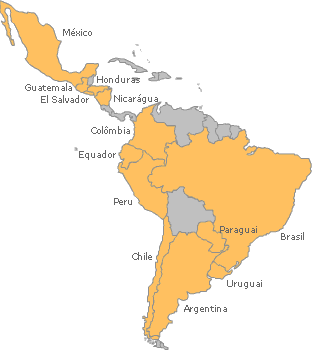Is the world advancing towards globalization or will regionalization stake its claim ?

Recent events in Latin America suggest that instead of the greatly marketed idea of "golobalization," the world may actually be advancing towards division into blocks or regions which come together more out of mutual interest than any coherent plan.
Globalization from the point of view of the multi-national corporations which dominate the U.S. and Europe is actually an euphenism for the expansion of business around the world in such a way that the so-called "invisible" market factors can become predictible components in a re-shaping of economic, social, cultural and political life in accordance with the needs and necessities of corporate society.
One component of this disguised expansionism is the notion of "preventive wars" developed by the Bush Administration to deal with what Washington has described as "the axisis of evil," that is nations with political, cultural or economic structures that resist the globalization and the attempt to organize the world's economic resources in accordance with the demands of the corporate vision. In effect, the "preventive wars" in Iraq and Afghanistan are attempts not only to bring "democracy" to those countries but also to incorporate them into the system of globalization. However, the process has remained stalemated in those two countries and has not advanced to others included in the axis--Syria, Iran and North Korea, the most mentioned.
The wars in Iraq and Afghanistan have been super costly and have not yet produced any clear results in terms of achieving docile governments willing to impose Western style democracy, and open up their territories to the exploitation of natural resources--especially oil--needed to feed the globalized economy.
One result appears to be a shift of attention to from the Middle East to Latin America. The relative absence of U.S. presence in the area, due to involvement in the war in Iraq and against terrorism, has facilitated the arrival of center left governments in a growing number of Latin American countries: Chile, Argentina, Uruguay, Brazil, Bolivia, Venezuela, Ecuador, Nicaragua...
For years U.S. policy had concentrated on Colombia, due to the presence there of several key factors: drugs, the continent's oldest armed guerrilla movement and the geo-political importance of the country. It has received more military aid than any other Latin American country, in spite of the existence of para-military gangs and flagrant rights abuse.
It was therefore less than a surprise when Colombia recently bombarded a FARC guerrilla camp inside the Ecuadorian border, without advising the Ecuadorian government. The action constituted a de facto rehearsal of the notion of "preventive warfare" in the area, in this case carried out not by U.S. forces but by the Colombian military (although according to press accounts with U.S. advisorship)
What few observers expected--either those favorable to U.S. policy or those opposed to it--was the rapid rejection of the action taken by the vast majority of the region's governments. Even Peru, which via Allan Garcia, has been strongly courting the possibility of signing free trade agreements with Washington, took a critical position with respect to the allegations of violation of Ecuador's sovereignty.
In view of the long history of U.S. interventionism in Latin America, and the increasing air of independence in the area, it would have been extremely difficult for Colombia's action to go unheeded.
But even before the recent action against Ecuador, there had been movements in favor of regional economic and political groupings. For a decade the Merco-Sur had been hibernating but over the past five years has assumed a more dynamic and political stance, favoring regional relations over those with the United States. Venezuela has not only contributed to the de facto slicing of the U.S. imposed embargo against Cuba; it has made possible the replacement of oil which Cuba previousl imported from the ex-Soviet Union and has facilitated economic and cultural contacts between Cubans, Venezuelans and other countries in the area.
The ALB, a grouping more radically opposed to trade alliances with the U.S., seems to have perked up after a slumber to get the enthusiastic support of countries such as Cuba, Venezuela, the Dominican Republic and even previously staunchly pro U.S. countries such as the Granadas, Barbados and San Vicente.
Perhaps a bit less ostentaciously, Brazil and Argentina have signed a number of significant agreements, including one on exchange of know-how on atomic energy, the joint manufacture of military vehicles and a space satellite.
The latest move is Unasur, a multilateral organization of South American nations bringing together the Merco-Sur and the Andian Community. Furthermore, Brazil has proposed the creation of a Southamerican Security Council, clearly stimulated in part due to concern of Colombia's violation of Ecuador's sovereignty.
In other parts of the world also regional groupings are growing in strength simply because they give their members more negotiating power than they would have in a uniform "globalized world." Where this process is headed is anyone's guess. However, it very likely will take a course not too clearly envisionaged on the computers of the global planners.
What remains to be seen is whether the next president of the U.S. will continue Washington's approach to globalization or seek a way to disentangle itself from it unilateral policy.
0 comentarios